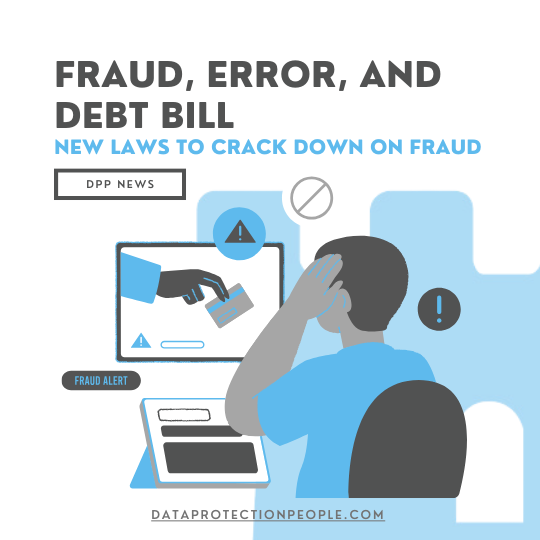New Laws to Crack Down on Fraud
Data Protection People News
The UK government’s new Fraud, Error, and Debt Bill aims to tackle social security fraud, with enhanced powers for investigations and debt recovery. Learn about the bill’s impact on organisations, the safeguarding of vulnerable customers, and what it means for data protection.

New Laws to Crack Down on Fraud: What This Means for Your Organisation
The UK government has recently announced the introduction of the Fraud, Error, and Debt Bill, aimed at reducing fraud in the social security system. This significant legislation will give the Department for Work and Pensions (DWP) greater powers to detect and stop fraudulent activities. The bill is expected to save £1.6 billion over the next five years, strengthening the government’s stance on fraud prevention and ensuring that vulnerable customers are protected.
With fraud costing taxpayers nearly £10 billion annually, the government’s new measures are designed to better investigate and prevent fraudulent behaviour, especially in an increasingly sophisticated digital environment. Since the COVID-19 pandemic, approximately £35 billion has been lost to fraud and error, highlighting the urgent need for stronger legal tools to keep pace with emerging risks.
Key Powers of the Bill
The Fraud, Error, and Debt Bill introduces several new powers for the DWP, including:
- Enhanced Investigation Capabilities
The DWP will be able to conduct more thorough investigations into suspected fraud, with new powers of search and seizure. This is a major step forward, allowing authorities to take greater control of criminal investigations, particularly against organised gangs defrauding the taxpayer. - Improved Debt Recovery
This legislation will enable the DWP to recover debts from individuals who are capable of repaying but have avoided doing so. This shift aims to bring greater fairness to the debt recovery process, ensuring those responsible for overpayments are held accountable. - Data Sharing for Fraud Detection
Financial institutions, such as banks, will be required to share information that might indicate potential benefit overpayments. This will improve the DWP’s ability to detect fraud earlier, ultimately protecting the system from significant losses.
Safeguarding Vulnerable Customers
While the government is taking a tough stance on fraud, it is also ensuring that vulnerable individuals are protected. The bill includes several safeguarding measures, such as specialised staff training and new oversight mechanisms to monitor the use of these powers. It’s important to note that DWP staff will not have access to individuals’ bank accounts, nor will personal data be shared with third parties without consent.
A Code of Practice will also be introduced, with a consultation taking place during the passage of the bill, to ensure transparency and public trust in how these new powers are applied. This careful balance aims to protect public funds while safeguarding the rights and privacy of citizens.
The Bigger Picture: A Government Commitment
This new legislation demonstrates the government’s commitment to protecting taxpayer money and supporting those who truly need help. The social security system is a crucial lifeline for many, and by reducing fraud and error, the government is reinforcing its manifesto pledge to tackle waste and abuse within public services.
As part of our ongoing commitment to helping organisations navigate data protection challenges, Data Protection People offers expert guidance on a wide range of compliance topics. The Fraud, Error, and Debt Bill raises important questions about data sharing, individual privacy, and organisational responsibilities, all of which fall within our expertise. If you or your organisation are concerned about how these changes may affect your operations, feel free to reach out to our team of specialists.
Learn More on Our Podcast
We will also be discussing this topic in greater detail on this week’s episode of the Data Protection Made Easy podcast. As part two of our ongoing series on International Transfers, we’ll explore how this legislation intersects with data protection laws and what it means for organisations handling sensitive data. Don’t miss the opportunity to gain valuable insights and ask questions during the live session.
